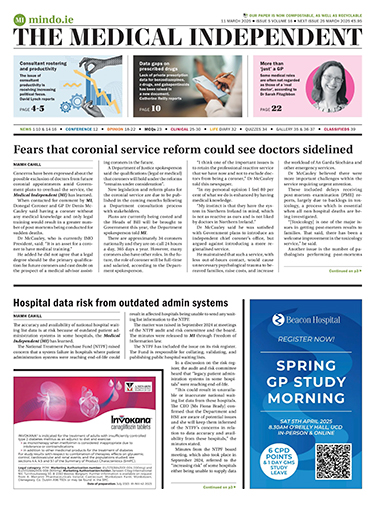Scientists at The Irish Longitudinal Study on Ageing (TILDA) at Trinity College Dublin (TCD) have released fresh research findings outlining the frequency with which older people in Ireland express a ‘wish to die’, including thoughts of one’s own death, that one would be ‘better off dead’, or wishing for one’s death. The findings are published in the journal Age and Ageing today.
The research, involving a large population of over 8,000 community-dwelling older people, examines the prevalence of those who wish to die, how closely it is linked with depression and loneliness, and the likelihood that the wish to die persists over time.
Researchers found that almost 4 per cent of people surveyed, who were over the age of 50, expressed a wish to die. However research shows that these feelings were transient for most, and did not persist in over 70 per cent of participants surveyed two years later.
Researchers propose that an enhanced focus on improving access to mental health care is needed and addressing social isolation in older people as a public health priority. This is particularly pertinent in the current contest of the Covid-19 pandemic.
One out of 29 community-dwelling older people reported that during the preceding month they had felt that they would rather be dead.
Some 60 per cent of those who reported a wish to die had co-existing depressive symptoms.
Over half of those with a wish to die and depressive symptoms had been diagnosed with depression, indicating a high burden of undetected mental health problems in this group.
Almost three quarters of those with a wish to die were also lonely.
Seventy-two per cent of these participants no longer reported a wish to die when reassessed two years later, indicating that in many cases the wish to die did not persist.
In cases where wish to die did not persist, loneliness and depressive symptoms also improved significantly, suggesting an important link.
According to the researchers, these finding are particularly relevant given the current debate around proposed legislation for assisted dying and the Dying with Dignity Bill 2020.
First author of the study Dr Robert Briggs, Medical Gerontology, TCD, and Consultant Geriatrician, St James’s Hospital, Dublin, commented: “These findings demonstrate the close association between depression and the wish to die in later life. Most older people with both a wish to die and co-existing depression had not been formally diagnosed with depression, nor received appropriate mental health treatment.
“Less than one tenth had received psychological counselling. An enhanced focus on improving access to mental health care should therefore form an important part of any discussion around assisted dying in later life.’
Senior author Prof Rose Anne Kenny, Head of Medical Gerontology, TCD, and Consultant Geriatrician, St James’s Hospital, Dublin, added: “The timing of these findings greatly increases their importance and they should inform the decision of legislators and practitioners as they consider the complex issue of assisted dying in the Dying with Dignity Bill 2020.
“Almost two-thirds of participants expressing a wish to die in this study have at least one chronic illness; meeting the criteria for a ‘terminal illness’ as proposed in the Bill.”
“This study demonstrates that a wish to die in later life is often transient but is closely linked with remediable factors such as loneliness and social isolation, the burden of which is likely to increase significantly during the Covid-19 pandemic.”
The study is available at the following link: https://academic.oup.com/ageing/advance-article/doi/10.1093/ageing/afab010/6133225













Leave a Reply
You must be logged in to post a comment.